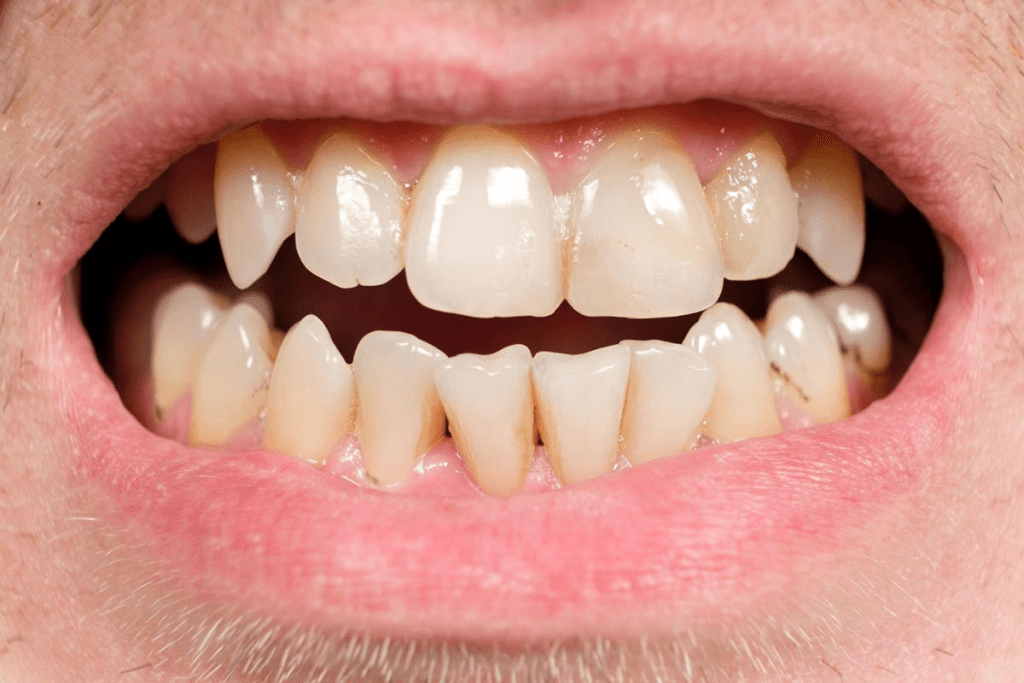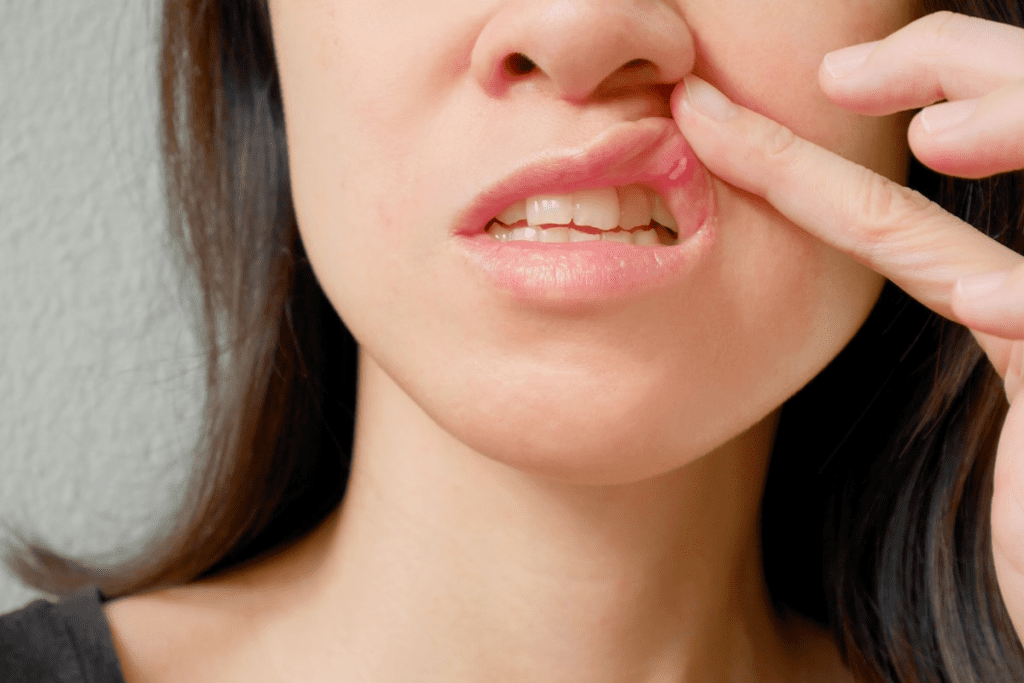Last Updated on November 19, 2025 by Saadet Demir
Chemotherapy is a lifesaving treatment for cancer but can harm your oral health. More than 85% of patients get oral side effects, like problems with their teeth and gums.

These issues, known as “tumour teeth” problems, can be serious. They include tooth decay, infections, and growth problems. It’s important to know about these risks to help with recovery and dental health. By understanding these challenges, we can prevent them.
Chemotherapy doesn’t just fight cancer; it also affects our mouths. It targets cells that grow fast, like cancer cells. But it also hits other fast-growing cells, like those in our mouths.

Chemotherapy uses drugs to kill or slow down cancer cells. But it can also harm normal cells that grow fast, like those in our mouths. This can cause problems like mouth ulcers and chemotherapy-related issues.
The drugs in chemotherapy can damage the mucous membranes in our mouths. This leads to painful ulcers and sores. This condition, called mucositis, makes it hard to eat, drink, and even swallow. The National Cancer Institute says managing these side effects is key for cancer patients’ well-being.
Oral tissues are very sensitive to chemotherapy because they renew themselves fast. The mouth’s lining is always changing, making it more vulnerable to chemotherapy’s effects. This can cause issues like oral cancer mouth sores and bleeding gums cancer patients face.
Chemotherapy also changes our mouth’s environment. It can reduce saliva and upset the balance of oral bacteria. This raises the risk of tooth decay, gum disease, and infections. Keeping our mouths clean and seeing the dentist regularly is very important during this time.
It’s important to know about dental side effects during cancer treatment. Patients often face oral health problems because of chemotherapy and other treatments.
Cancer treatment can lead to mouth sores and swollen gums right away. These problems can hurt and make it hard to eat and brush teeth.
Mouth sores, or mucositis, are a common side effect of chemotherapy. They can pop up anywhere in the mouth, making it hard to eat and drink. Proper oral care and special mouthwashes can help ease these symptoms.

Cancer treatment can also cause long-term dental problems. These include long-term side effects of tooth extraction and other dental issues in young patients.
Some patients might get dental developmental anomalies, like enamel hypoplasia or root malformations, if they got treatment early. These can affect the health and look of their teeth for a long time.
Patients on chemotherapy face a higher risk of dental caries and decay. Good oral care is key to their treatment. Knowing these risks helps manage them better.
Research shows chemotherapy patients get more dental caries than others. This is due to several reasons. Changes in oral hygiene, diet, and chemotherapy’s direct effects on teeth and saliva play a part.
Chemotherapy can lower saliva production, causing dry mouth (xerostomia). This is a big risk for dental caries. Saliva helps neutralize acids and remineralize teeth; without it, decay speeds up.
Several factors speed up decay in chemotherapy patients. Chemotherapy can harm the oral mucosa and teeth, making them more prone to decay. It also changes diet, leading to more sugary or acidic foods that cause caries.
Also, a weakened immune system during treatment makes patients more likely to get oral infections. These infections can worsen dental caries. Keeping up with oral hygiene and dental visits is vital.
We suggest chemotherapy patients work with their dental team to create a care plan. This plan should include frequent fluoride applications and regular monitoring to fight and manage dental caries.
Dry mouth, or xerostomia, is a big problem for many chemotherapy patients. It happens because chemotherapy harms the salivary glands, making less saliva. Saliva is key for oral health, helping with digestion, neutralizing acids, and strengthening teeth.
Chemotherapy can really hurt the salivary glands, making it hard for them to make saliva. This is because chemotherapy agents target fast-growing cells, like those in the salivary glands. So, patients often make less saliva, causing dry mouth.
Dry mouth can badly hurt dental health. Without enough saliva, teeth are more likely to get cavities and gum disease. Saliva helps fight acids and strengthen teeth. Without it, teeth are more at risk.
Managing dry mouth is key to protect dental health. This includes using saliva substitutes, keeping up with oral hygiene, and seeing the dentist often. Knowing the causes and effects of dry mouth helps healthcare providers create better care plans for it.
Chemotherapy often changes how people taste, making it hard to eat well. Many patients find their sense of taste is off. This can make food taste bad or not taste like anything.
Research shows that 61.8% of those getting chemo notice changes in taste. This big number shows we need to find ways to help with eating.
These taste changes can make it hard to get enough nutrients. It’s important for doctors to help with this problem.
Burning tongue syndrome is another issue some face during treatment. It feels like the tongue is burning. This can make eating even harder.
If you’re dealing with these taste problems, talk to your doctor. They can suggest ways to make eating easier. This might include changing what you eat, taking care of your mouth, or using medicine to help.
By tackling these taste issues, we can help patients stay healthy while they’re going through treatment.
Teeth problems, known as ‘tumour teeth,’ are a big worry for cancer patients on chemo. These issues can harm their oral health and overall health, more so in kids and teens.
Enamel hypoplasia is a common problem from cancer treatment. It happens when teeth enamel doesn’t fully grow, causing structural weaknesses. This makes teeth more likely to decay and feel sensitive.
Children are at a higher risk because their teeth are growing during chemo. Enamel hypoplasia isn’t just about looks; it can cause serious dental issues. Teeth without enough enamel might need special care to avoid cavities and tooth loss.
Chemotherapy can also lead to root malformations, changing the shape and structure of tooth roots. This can cause long-term issues like unstable teeth and trouble with dental anchorage. Root malformations can make dental treatments harder, so patients need thorough dental care before, during, and after treatment.
The effects of root malformations go beyond dental problems. They can affect a cancer survivor’s overall oral health and quality of life. So, it’s key for doctors and dentists to work together to handle these issues well.
Knowing about tumour teeth risks helps us give better care to cancer patients. We can offer preventive steps, timely help, and ongoing care to deal with any tooth problems that come up.
Chemotherapy and other cancer treatments can cause swollen and bleeding gums. Keeping your mouth healthy is key during treatment. Periodontal problems can be a big worry.
Periodontal diseases like gingivitis and periodontitis can get worse with cancer treatment. This can lead to a lot of discomfort and serious issues.
Swollen gums are common in cancer patients. Chemotherapy and changes in oral care can cause this. To help, brush and floss gently.
Bleeding gums can mean you have periodontal disease, which gets worse with cancer treatment. If bleeding doesn’t stop, see your dentist or doctor. They can help figure out what to do.
Some things to worry about with bleeding gums include:
Knowing the risks and taking action can help manage gum problems during cancer treatment. Regular dental visits and good oral care are key to keeping your gums healthy.
Oral mucositis is a painful side effect of chemotherapy. It can really hurt a patient’s quality of life. We need to tackle this problem head-on during cancer treatment.
“Oral mucositis can be very tough,” says experts. “It makes eating, drinking, and treatment hard for patients.”
Stopping oral mucositis starts before chemo. First, we do a detailed check of the mouth. This finds any dental problems that could make things worse.
Then, we make sure patients brush their teeth gently. They use a soft toothbrush and fluoride toothpaste. Rinsing with a saline solution or a special mouthwash is also key.
Even with prevention, some patients get oral mucositis. Then, we need to help them feel better and heal.
We use special gels or mouthwashes to ease pain. Sometimes, we also give medicines to help with pain.
Key relief strategies include:
A study shows, “Prevention and treatment of oral mucositis need a team effort. This includes dental care, pain management, and nutrition.” A full team approach is essential for managing oral mucositis well.
Getting dental care is key for those with cancer. Cancer treatments can harm your mouth, but good dental care can help. It’s important to act early to prevent problems.
Before starting chemotherapy, a detailed dental check is vital. It helps find and fix any mouth problems. This includes:
The American Dental Association says this check can lower the chance of mouth problems during treatment.
Keeping your mouth clean during treatment is very important. It helps avoid mouth sores, infections, and tooth decay. We suggest:
Good oral hygiene can greatly lower the risk of mouth problems. It also makes life better during treatment.
After treatment, you might need dental work to fix any lasting damage. This could be:
Good dental care after treatment can fix your mouth. It makes you feel better overall.
It’s key for oncologists and dental teams to work together. This helps manage oral health issues that come up with cancer treatment. We know cancer treatment is more than just fighting the tumor. It’s also about keeping the patient’s overall health, including their mouth, in good shape.
Having a treatment plan that covers both cancer treatment and oral health is vital. Oncologists and dental teams must work together to spot oral problems early and find ways to handle them. This teamwork helps avoid and lessen oral health issues, making life better for patients during and after treatment.
Dental experts should do a full check-up before cancer treatment starts. This check-up finds any mouth problems that could get worse with treatment. Acting early can stop problems like infections, which are big worries for patients on chemo or radiation.
Even with the best prevention, dental emergencies can happen during cancer treatment. It’s important for patients to know when to seek emergency dental care. Signs like a bad toothache, swelling, or bleeding gums need quick help. Patients should call their dentist or get emergency care if they see these signs.
We suggest patients understand their treatment plan and know who to call in a dental emergency. Having a 24-hour emergency contact can make patients feel safer and get help when they need it.
By working together and having a detailed treatment plan, we can greatly improve oral health for cancer patients. This team effort not only makes life better for patients but also helps them recover from cancer better.
Keeping your teeth healthy is very important for cancer patients. This helps avoid and manage mouth problems. We’ve learned that chemotherapy can cause dental issues like cavities, dry mouth, and gum problems.
Knowing these risks and keeping up with good oral care can help. Working together with doctors, dentists, and patients is essential. This teamwork helps provide the best care and results.
We stress the need to protect your dental health during cancer treatment. This way, patients can avoid mouth problems and focus on getting better. Good oral care is a big part of cancer treatment. We urge patients to team up with their healthcare team for the best oral health.
Chemotherapy can cause many oral health problems. These include mouth ulcers, mucositis, bleeding gums, and dry mouth. It can also lead to tooth loss and dental issues later on.
Oral mucositis is a common side effect of chemotherapy. It causes mouth inflammation and ulcers. To manage it, keep your mouth clean and use special mouthwashes. You can also use pain relief and follow specific oral care routines.
Yes, chemotherapy can harm the salivary glands, causing dry mouth. This increases the risk of tooth decay, gum disease, and other oral health problems.
Taste changes, like a reduced sense of taste or dysgeusia, can make eating hard. It’s hard to keep a balanced diet.
Chemotherapy can cause long-term dental problems. These include tooth loss, dental anomalies, and root malformations. These issues can affect the health and stability of your teeth.
Good oral hygiene is key. Brush and floss regularly and use certain mouthwashes. A dental check-up before starting chemotherapy can also help.
Working together is essential. Oncologists and dental professionals can provide better care for cancer patients. This helps prevent and manage oral complications.
Yes, chemotherapy can cause bleeding gums. This is a sign of periodontal problems. Be concerned if bleeding doesn’t stop or is painful.
Chemotherapy can damage the salivary glands. This reduces saliva production and causes dry mouth.
Dental caries are a big risk during chemotherapy. Changes in oral hygiene, diet, and the effects of chemotherapy on teeth and saliva contribute to this.
Yes, some oral cancer medications, including chemotherapy, can cause mouth sores and other oral problems.
Burning tongue syndrome is a condition that can happen during cancer treatment. It causes discomfort and pain. It’s linked to taste changes and other oral issues.
Subscribe to our e-newsletter to stay informed about the latest innovations in the world of health and exclusive offers!